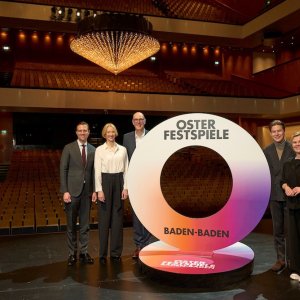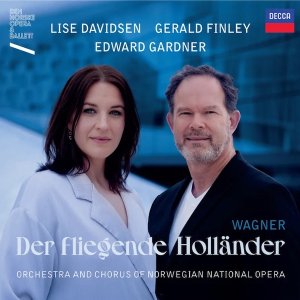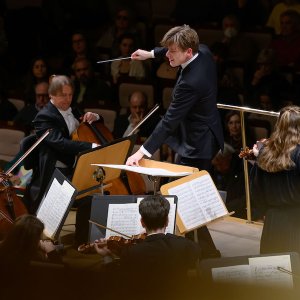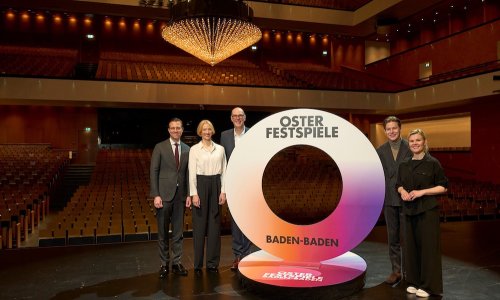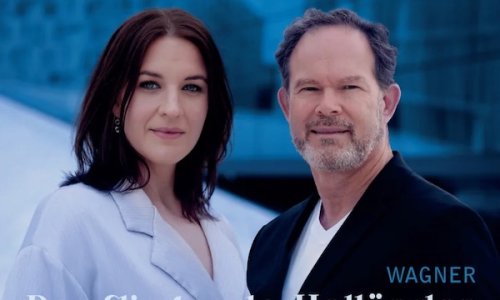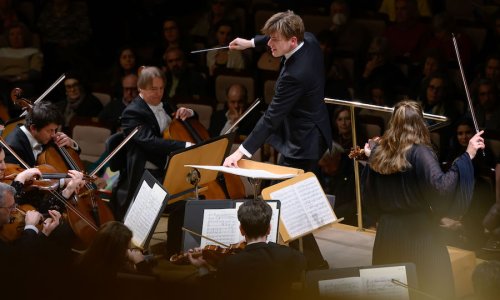
Klaus Mäkelä: "I aspire to respect and be respected around music"
The figure of the young Finnish conductor Klaus Mäkelä has been a real revelation in the current classical music scene. By his precocity but also by his maturity, his authority on the podium has already earned him a double tenure with the Oslo Philharmonic and the Orchestre de Paris. He has also become the first conductor to sign exclusively with the Decca label after Solti and Chailly. In fact, today sees the light of day his first major recording project, a complete set of the symphonies of Jean Sibelius with his Oslo orchestra. On the occasion of this new recording, and at the height of his reputation as a rising star, we talked with Klaus Mäkelä, who is the cover of our April print edition.
Your first major recording project, the complete symphonic works of Jean Sibelius, with the the Oslo Philharmonic, is being released today. In a way it is a blow on the table: "This is me, this is my orchestra and this is how we interpret the music of Sibelius". This is also your first recording as exclusive conductor for the DECCA label. If I'm not mistaken, you are the first conductor to be signed exclusively by this label after Sir Georg Solti and Riccardo Chailly, no less.
It's really exciting, yes. I have always been a great lover of recordings, they have always been with me and of course DECCA was there from the very beginning, with so many great artists recording for this label. Not to forget that they released the first complete Ring with Sir Georg Solti and the Vienna Philharmonic, a real historical milestone. That is why it is especially exciting to begin my recording collaboration with them with this complete set of Sibelius symphonies. I am truly honored and grateful for this project.
When and how did you decide to record this complete set of Sibelius' symphonies?
From the very beginning of my relationship with the Oslo Philharmonic, the musicians wanted us to do music by Sibelius together, a composer they had barely performed in the previous years. And almost without intending to, it turned out that for my first year as the orchestra's chief conductor we had programmed a cycle of all Sibelius symphonies (laughs). Shortly after that the opportunity arose to start this recording collaboration with DECCA and they were also very excited about the idea of recording the Sibelius symphonies. So it was quite a natural and organic thing, the path that has led us to have this recording in our hands.
Although I must say that the pandemic upset the plans quite a bit. At first the idea was to perform the whole cycle of symphonies in concert and later take it to the recording studio. But the pandemic forced us to start with restrictions, without an audience and with important distances between the musicians. This is how we played and recorded the sixth and seventh symphonies. We were in January 2021, with everything locked down outside. So we got down to work and took advantage of those weeks to move forward with the recording. So, between the end of January and the beginning of February we tackled the second symphony.
It was a very strange experience, you know, because the confinement was then quite severe and there was no activity in the streets, almost nothing was open. So the musicians went from their homes to the studio and back to their homes, and so on for days and days as the recording continued. This allowed us to be totally immersed in the Sibelius universe and I think that is somehow reflected in the recording.
Beyond the familiar seven Sibelius symphonies, in this recording you have also included several excerpts from the planned and controversial eighth symphony, which never saw the light of day.
That's right. You know, it's interesting because the cycle of Sibelius' symphonies seems to end with a question mark. He tried to shape an eighth symphony for more than ten years. Some sources even point out that he finished it but, not satisfied with the result, he burned it. In any case, in the 1990s several fragments of this eighth symphony were found among Sibelius' manuscripts and came to light with the idea of recovering the score, albeit in a fragmentary way. They are really short fragments, but very stimulating.
I have always been fascinated by the evolution of Sibelius' symphonic discourse. We start from the first symphony, which still moves in a language close to the German tradition, intermingled with the Russian tradition. And from then on, from the second to the fifth, he traces his own style, a very definite aesthetic, with a very recognizable orchestral architecture. The sixth and seventh symphonies finally open up a new universe, something really unprecedented, perhaps exploring a very personal path towards atonality, something that would surely have been rounded off with that hypothetical eighth symphony. That is why it seemed so opportune to record these fragments, to illuminate the question that remains on the table after Sibelius' seventh symphony.
Regarding the performance tradition of Sibelius' symphonies, and in line with your interest in the discography you mentioned before, have you been particularly identified or inspired by any previous cycle, by any particular baton? Do you have any cycle of choice?
I am really fascinated by this question of the recordings of the Sibelius symphonies and yet I have tried not to keep them too much in mind when making our own recording. In any case, some of my favorites are the earliest ones, such as the Kajanus cycle from the early 1930s in London. I am also fascinated by the cycle by Armas Jämefelt, also a composer and who was in fact the brother of Sibelius' wife. Jämefelt has some really interesting recordings, from radio broadcasts from Stockholm and Helsinki. And of course Karajan, who left us some really impressive Sibelius recordings. I also grew up with the recordings of Paavo Berglund and Leif Segerstam, which are referential.
Continuing with Sibelius, I believe you have on the agenda a tour with the Oslo Philharmonic in May and June, performing all of his symphonies.
That's right, I'm really looking forward to that. We will do the complete cycle with all of Sibelius' symphonies at the Elbphilharmonie in Hamburg and at the Konzerthaus in Vienna, over three nights in each city. I am looking forward to such an intense experience, a total immersion in the music of Sibelius.
Do you already have any other recording projects on the table with your Oslo orchestra?
Yes, we have already started our next recording project. I can't tell you exactly which composer it is, but let's say it's someone from the former Soviet Union and his last name begins with "s" (laughs).
Let me tell you, joking aside, how honored I am with this tenure in Oslo. They really are an extraordinary orchestra, as a group and as professionals. Every week that I come back they make me feel at home, it's a wonderful thing. It's a rigorous, honest, serious, kind orchestra... I can't ask for more, every program is a wonderful experience for me.
I am very curious about your idea of making music from the podium. As you well know, there is a tradition of leadership understood as authority, around the work of the conductor, in contrast to an option that is gaining more and more ground, the way of communication and dialogue, in a common search with the musicians. I imagine that you identify much more with this second way of doing things.
My old conducting teacher always gave us a piece of advice: "Help without disturbing". That's what our work from the podium is all about. Conducting comes down to communication. Communication between the musicians, communication to the audience, communication from the score... The most important thing is to understand this in a sincere and honest way, with the best will towards the music and towards the musicians. If a conductor knows what he wants and does not feel insecure, I think there is no need to resort to any gesture of authority beyond the mere dialogue with the musicians. Nobody likes to be treated with authoritarianism, leadership is something else. It is impossible to involve a musician in your idea of a score if you do not treat him with respect and kindness. Getting a musician to give the best of himself is precisely a matter of understanding the difficulty of his work, the tension he goes through in each passage, and so on. Authority is one thing and respect is quite another. I aspire to respect and to be respected in music. A good conductor is a good musician, this may sound obvious, but many people don't think so. A nice gesture, a good technique... nobody cares about those things if when it comes to talking about music there is no convincing discourse. For this reason, a conductor also has to be a good psychologist, in the sense of identifying the feelings of the musicians, the possibilities of the orchestra with which he is working, and so on. It is no use imposing a vision that is going to collide with the reality on the music stands. Ultimately, a conductor's job is nothing more than getting the musicians to give their best in every measure.
Having started your career as a cellist, at what point did you discover that your great passion, your vocation after all, was conducting?
I have a funny story about this. When I was in first grade at school, when I was seven years old, I was in the children's choir of the opera Carmen at the National Opera in Helsinki. And it was the first time I saw a conductor in the pit, with his baton. It made a big impact on me, I have that image engraved in my memory. Somehow, I think I decided at that moment that I wanted to be a conductor, although obviously it's a ridiculous thing to do, you don't make a decision like that at a moment like that (laughs). But conducting was always a passion that traveled with me from then on, every time I listened to records and discovered scores.
At the age of twelve, as a cellist, I entered the young section of the Sibelius Academy. And there I learned that there was a class for young conductors, with the legendary Jurma Panula. What he was doing in those classes was a wonderful thing, because he somehow believed that it was possible to instill a passion for conducting in such a young mind. Conducting an orchestra can be a very complex thing, but if you start so young, you grow with it in a way that comes naturally to you.
With Panula there was a small ensemble every week, with students and teachers playing together. And we had the opportunity to conduct that small ensemble from the podium, in a very natural way, I must emphasise. And there I learned to understand conducting as something that comes out of dialogue and communication with the musicians; there is no point in feeling in possession of the truth or of some higher power, an authority from which to impose a point of view. With Jurma Panula I learned very early on that this was useless, precisely because I experienced the opposite on a daily basis. Panula used to tell us: "Conduct, conduct... and when something doesn't convince you, stop the musicians and give them a precise, clear and brief instruction, and go on... And so on and so forth. It was a very practical and instinctive way of approaching conducting.
The figure of Jurma Panula is truly iconic, there are already several generations of Finnish conductors who have passed through his hands.
Jurma Panula is an extraordinary pedagogue. He is a typically Finnish man, in the sense that he speaks little but says very intelligent, direct, very wise things. Working with him, besides being great because of the small orchestra I was telling you about, had an added value because he always recorded the sessions and gave us the opportunity to see ourselves conducting. And there is nothing better than seeing yourself from the outside to analyze your mistakes and see where you can improve. It was funny because very often you are not aware of what you are doing on the podium, you get carried away and you can give absolutely unnecessary and useless indications that only confuse the musicians. That's why his method was so brilliant, because he really taught you to conduct in such a way that you could help without disturbing, as I was telling him at the beginning.
You are currently the chief conductor of two very different orchestras, in Oslo and Paris. These are also very different cities, cultures and audiences in each case. Perhaps that is the most exciting part of this simultaneous tenure.
Yes, I am thrilled to have this opportunity. I learn a lot from both orchestras, being so different. I feel like I've had to arm myself with two different toolboxes to work in each city, you know. It's as if I have to somehow unfold myself to meet the needs of each orchestra, at each time, and that's fascinating from my point of view. The same tools that I use in Oslo would not work in Paris, and vice versa. And with this I learn a lot in every rehearsal.
Both orchestras have a lot of tradition, a lot of personality, they have very different auditoriums, with different acoustics, and certainly the audiences in each city are very different. But that richness is what makes it so exciting to work with both orchestras, especially having the chance to create something of my own with them, coming back every week. Being guest conductor of other orchestras is a great thing, but I enjoy more and more this possibility of creating something in common, over time, with the two orchestras in Paris and Oslo.
What would be the most particular characteristics of each of these two orchestras?
The Orchestre de Paris maintains a great tradition, a way of making music that goes back to the glorious times of the Paris Conservatoire. There is a special air in their way of understanding the profession. They are a highly technical training, capable of solving with apparent ease some really complicated scores, for example pieces of contemporary music. French musicians, in general, have a great academic background and a great sight-reading of scores, they are very precise and sensitive.
In the case of Oslo, we are talking about a powerful orchestra, very powerful, with its own sound, concentrated, deep. Working with such a dense and sometimes dark sonority, with such a tremendous control of their sound, is a challenge and at the same time a gift, because few orchestras today have their own recognizable sound, as is the case here.
In line with what you mention, I have the impression that you have a great perception of the sound, in the sense that you are very clear about the sound you want to obtain. This is something that is evident, for example, in your recent recording of Sibelius.
Yes, maybe it has to do with my training as a cellist. Sound comes first, it's a priority without a doubt. For me it would be an achievement if every orchestra had an identifiable sound, as was the case in the past with many of the great orchestras, some of them truly historic and famous for their sound, such as the Cleveland Orchestra, the Concertgebouw Orchestra... A consistent, finished sound, recognizable in a recording with just a few seconds. Today many orchestras have given in to the temptation of a kind of 'international sound' and are unrecognizable.
Returning to Sibelius, I confess that he is one of the composers who fascinate me the most, for his endless modernity, for his genuine emotionality. From your point of view, why is he perhaps, today more than ever, a composer of great relevance?
In my case, being Finnish, it is obvious that Sibelius' music means something very special. I grew up listening to his music from a very young age, he is a very popular composer there, even beyond the world of classical music as such.
I think he managed to build a tremendously personal style, very honest, direct, somehow simple but at the same time elaborated, with a really innovative sonority. And as I was saying before, it is fascinating to see how his style evolves throughout the symphonic cycle. With few composers do you have the impression of evolving, as a listener, at the same time as the music evolves.
Something that fascinates me about Sibelius is his architecture, his conciseness. Sometimes there are tremendously inspired composers, with very emotional themes, but they extend the same idea for minutes and minutes, without going beyond the obvious. That never happens with Sibelius, everything is in the exact place and has the right and precise duration. It is music of a rich austerity, so to speak.
You are also quite closely linked to contemporary music. In fact, you have premiered pieces by composers such as Unsuk Chin, Kaija Saariaho, Jörg Widmann... It is fascinating to see a young conductor engaged with the music of his time.
I think this is my responsibility. I love the music of the previous centuries, but obviously that music was also contemporary music in its day. We can't aspire to have a repertoire if we don't give a chance to the music being made today.
Given the vertiginous and relatively short professional trajectory of your career, the curiosity and openness with which you have devoted yourself to a very broad repertoire is impressive. You give the pleasing impression of having no fear or qualms, whatever your age. Sometimes one hears, among fellow musicians, that it is impossible to conduct a good Bruckner or a good Mahler, for example, until you are a mature conductor. I guess you don't agree with this.
When I started conducting I realized that one of the best things about this profession was having all the music in the world at your disposal, which was not the case when I was a cellist. Any part of the repertoire is infinite. And as time goes by you can go deeper and deeper into any work. That's the magic of music, somehow it never ends.
Of course, there are pieces and authors that perhaps it makes more sense to conduct later on, once I've gone through other scores. Every time I open a piece I find myself with dozens and dozens of questions and I try to answer them. But those works where I have more questions than answers, I leave for later.
Photo: © Marco Borggreve






